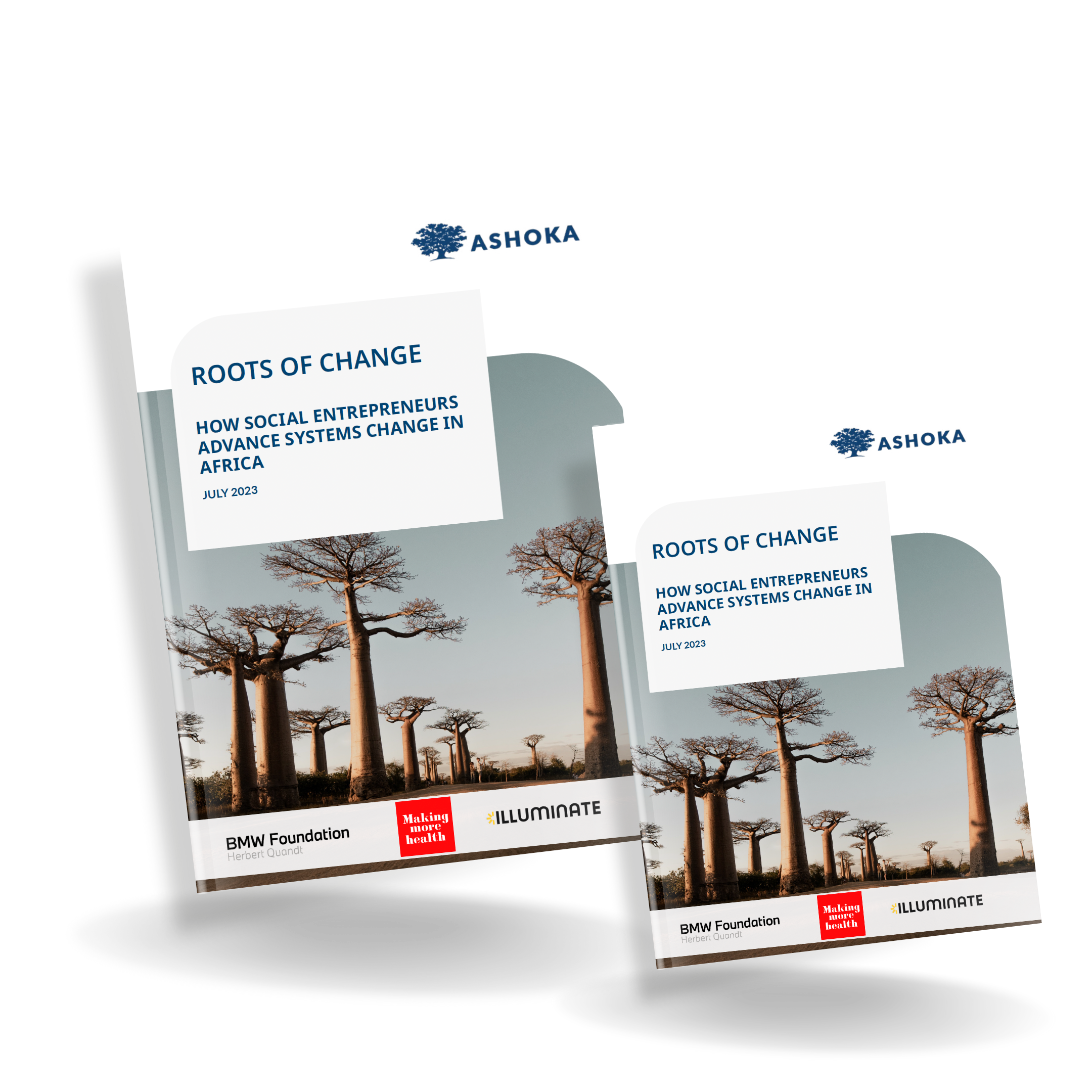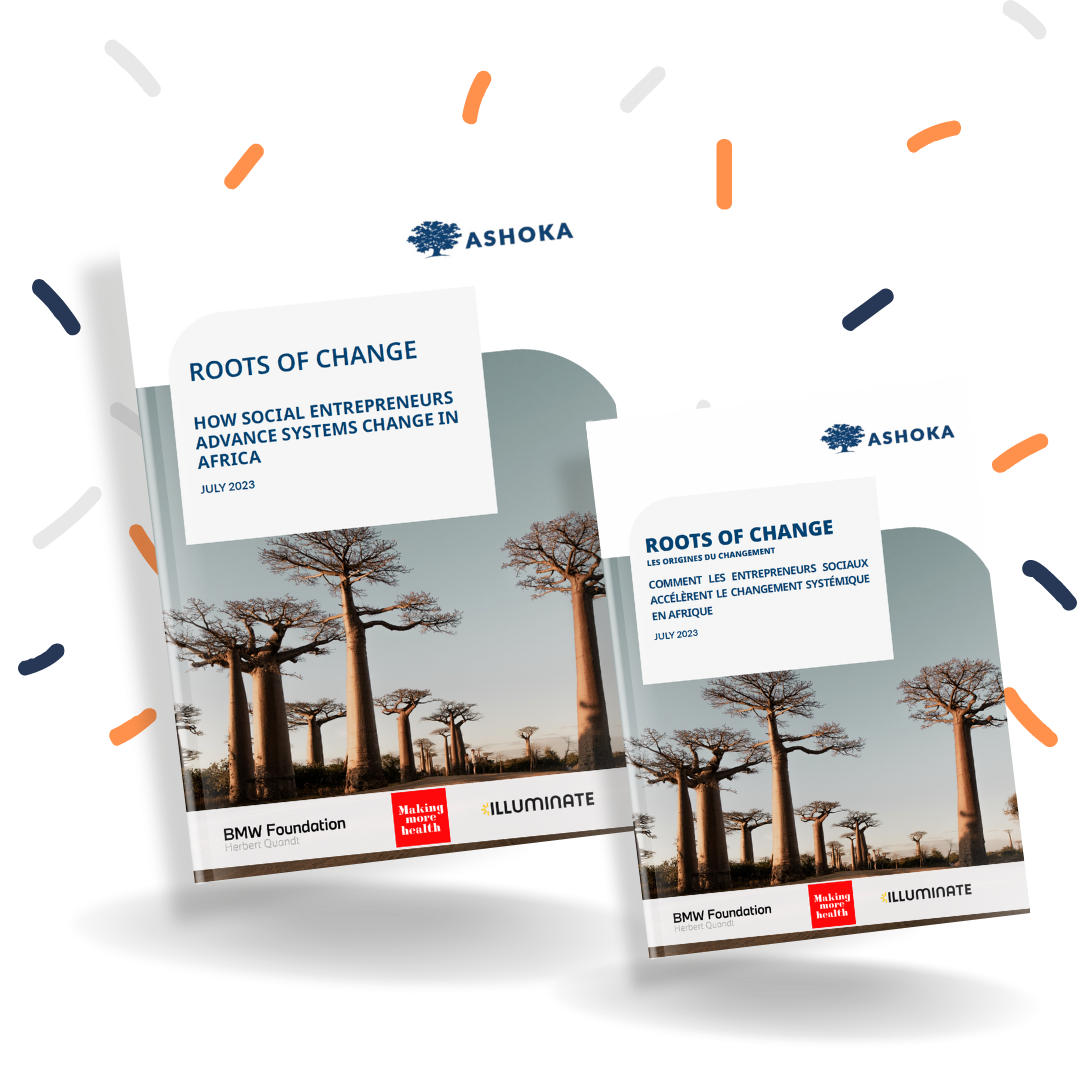Report Partners
We would like to extend a big thank you to Making More Health, the BMW Foundation Herbert Quandt, and Illuminate for supporting this project.
We express our gratitude to all contributors who made this report possible. And more importantly, the Ashoka Fellows for their outstanding work. The findings in this report are based on interviews with 5 Ashoka Fellows, and their stakeholders.

THE BMW FOUNDATION HERBERT QUANDT
The BMW Foundation Herbert Quandt promotes responsible leadership and inspires leaders worldwide to work towards a peaceful, just, and sustainable future. Through its activities, it aims to advance the Sustainable Development Goals of the United Nations’ 2030 Agenda. It does this by inspiring leaders to take their social and political commitment to the next level, across communities, cultures, and countries. Further, to drive positive change, it connects leaders through its global BMW Foundation Responsible Leaders Network. Finally, it invests in impactful organizations while encouraging leaders to embrace venture philanthropy and impact investing as effective tools for social change.


THE BMW FOUNDATION HERBERT QUANDT
The BMW Foundation Herbert Quandt promotes responsible leadership and inspires leaders worldwide to work towards a peaceful, just, and sustainable future. Through its activities, it aims to advance the Sustainable Development Goals of the United Nations’ 2030 Agenda. It does this by inspiring leaders to take their social and political commitment to the next level, across communities, cultures, and countries. Further, to drive positive change, it connects leaders through its global BMW Foundation Responsible Leaders Network. Finally, it invests in impactful organizations while encouraging leaders to embrace venture philanthropy and impact investing as effective tools for social change.
ILLUMINATE
Illuminate is an international and collaborative network that supports the emergence of systems change practice to advance the well-being of people and the planet. The network works to promote a world in which people are deeply connected to each other and the living planet, are aware to possibilities for change, and are able to embrace complexity to design systemic solutions to global challenges.


ILLUMINATE
Illuminate is an international and collaborative network that supports the emergence of systems change practice to advance the well-being of people and the planet. The network works to promote a world in which people are deeply connected to each other and the living planet, are aware to possibilities for change, and are able to embrace complexity to design systemic solutions to global challenges.

What role can you play in Advancing Systems Change in Africa?
What can Practitioners, Social Entrepreneurs, and Citizen Sector Leaders do?
We encourage you to deeply think about this despite the pressures of running an organization and the pressures of funders to focus on direct impact:
- What could be the overall impact of your scaling strategy to influence current practices?
- Do you understand the system you are trying to influence well enough? This includes the resources, rules, roles, relationships, and results that govern this system.
- Can you describe with precision the intended systems change and your likely contribution to it?
- How have you—and how can you—leverage data and evidence as well as current and unlikely partners so that you can confidently approach policymakers, administrative bodies, and influential players while often being considered to be a ‘small’ player?
- What changes does adopting a systems change strategy imply for your organization, your team, and the talent you want to attract?
- What does adopting a systems change approach imply for your leadership style, keeping in mind that pursuing systems change requires collaboration at all levels?
- What impact milestones can you design to measure your progress toward long-term goals?
- How can you monetize your systems change work through consultancies, training, certification, and/or membership fees? The good news is that systemic strategies do not need to be expensive.
What can Funders do?
As highlighted in Seven Steps for Funding Systems Change, you can:
-
Find systemic leaders: Start by finding current system changers who deeply understand the system and can advise throughout all further steps
-
Meet them on a level playing field: Meet them where and as they are to engage them as active co-leaders throughout all further steps
-
Align your support with the vision: Explore the vision together and the many different systemic strategies that can help achieve it
-
Commit to a lasting partnership: Based on this mutual buy-in, build a trusted partnership for long-term commitment to the vision
-
Strengthen their team: Invest in the people behind the work so they can keep learning, adapting, and creatively intervening in the system.
-
Strengthen their wider system: See the whole field of stakeholders critical to and affected by the vision, so their role in achieving it can be recognised and supported. Recognise and align your influence on these systems as well.
-
Invest in yourself and the funding system: Continue to build your own capacity for system change and support the evolution of the wider funding system together with systemic leaders.
What can Influential Business Government Players do?
- Acknowledge the current situation and engage in self-reflection regarding your contribution to it. This requires courage and determination as some influential organizations and individuals may be benefitting from dysfunctional or inequitable systems and may have contributed to these systems.
- Actively seek conversations with proximate leaders and social innovators in your sector/ system who understand social issues and strategies.
- Develop a clear vision and plan for change in collaboration with proximate leaders.
- Take a deliberate approach to explore whether you could leverage your influence, credibility, networks, and infrastructure to help create social change at scale by influencing how groups and individual organizations organize in the target system.
- Using ‘sandbox’ approaches, explore working with social entrepreneurs to test whether an idea truly has the potential to create system-wide impact.
We hope that this report, which also builds on a body of research and existing resources by Ashoka and like-minded organizations, will trigger some reflections on scaling social change. We remain committed to continuing to learn and act to build a stronger ecosystem for social entrepreneurship in Africa, together with vision-aligned partners across sectors.

